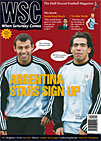 As Juventus go kicking and screaming into Serie B, Matt Barker reports on the failure of the new board to realise just how seriously the Moggi match-fixing scandal has damaged the club's reputation
As Juventus go kicking and screaming into Serie B, Matt Barker reports on the failure of the new board to realise just how seriously the Moggi match-fixing scandal has damaged the club's reputation
When, in July, the initial sentences in the Moggiopoli scandal were announced, Juventus appeared to take their punishments with reasonably good grace. They would, club officials claimed, co‑operate fully with the legal process and abide by whatever penalties were imposed. There was talk of a club reborn and, in the shadow of sporting director Gianluca Pessotto’s attempted suicide, of a more humble side to La Vecchia Signora. Some people even started to feel a little sympathy for them.
It didn’t last. The failure of preliminary talks with the Italian Football Federation (FIGC) saw the club respond bullishly, aggrieved by what they saw as an “incomprehensible” disparity in the penalties handed out. Juventus argued that they were the only one of the five principal clubs involved to put their house in order, bringing in a new board and management structure.
The new directors took legal advice (from the team that had represented Jean-Marc Bosman) and, passing over the Italian Olympic Committee (CONI), the next step in the appeal process, declared instead that it was to take the case directly to the TAR, the Lazio regional court.
FIFA saw the announcement as a direct contravention of their rules and stepped in to warn the FIGC that both Italian club sides and the national team faced expulsion from international competition if Juve went ahead. The FIGC threatened further sanctions against the Turin club, who were now looking at a real PR disaster: being responsible for the banning of the just-crowned world champions from the Euro 2008 qualifiers.
Juventus were keen to play the history and tradition card, aware that the TAR had infamously allowed Fiorentina to skip a division on their way back to Serie A after spending a season in C1 following financial irregularities in 2002. Demotion to Serie B would, in the words of new chairman Giovanni Cobolli Gigli, “inflict a serious blow to the very identity of Juventus FC… a tradition of excellence which continues to be alive and well, as the nine [actually eight] Bianconeri players who contested the recent World Cup final would show.”
But of course all that talk of history was just bunk. With share prices on the slide, press reports claimed, in the face of strong denials, that the club were preparing to sue for €130 million in damages – a sum that, if paid out, would have bankrupted the FIGC. Not only that but, as well as a return to the top division (the concession being the acceptance of a greater points deficit) they were also demanding the restoration of the 2005-06 league title.
With the FIGC insisting the season would go ahead and start as planned on September 9, Juve began to get the jitters. Fiorentina may have got lucky four years ago, but there was every possibility that the TAR would actually increase the original punishment (as Genoa found to their cost last summer, banished down to Serie C1 after appealing against a ruling denying them promotion to Serie A for fixing a game against Venezia). There was also the danger that, by trading an increased points penalty to keep their place in Serie A, the club would have gone down next year anyway, forcing them through a bitter relegation struggle in the shadow of fan and shareholder unrest.
Finally on August 31, the day before the TAR hearing, the club announced that the appeal was to be withdrawn, reasserting their “faith in the sporting justice system and willingness to cooperate for the good of Italian football”. Still seeking a reduction in their points punishment, Juventus now join the queue at the CONI appeal court behind Milan, Lazio and Fiorentina, all of whom failed in their initial appeals to the FIGC. And, having been knocked out of the Coppa Italia on penalties against Napoli in front of a euphoric San Paolo, the club now have to face up to at least two years out of European competition, with the attendant fall in revenues and disenchanted playing staff.
Gigi Buffon, Mauro Camoranesi and David Trezeguet remain in Turin (Alessandro Del Piero and Pavel Nedved had already pledged their immediate future to the club) and all will doubtless line up for the first game of the new season, away to Rimini in the 9,800-capacity Romero Neri stadium. Points deduction or not, it’s still going to be a tough nine months for the Bianconeri, and their opening games could be vital if the club are to clinch promotion at the first ever time of asking.
From WSC 236 October 2006. What was happening this month